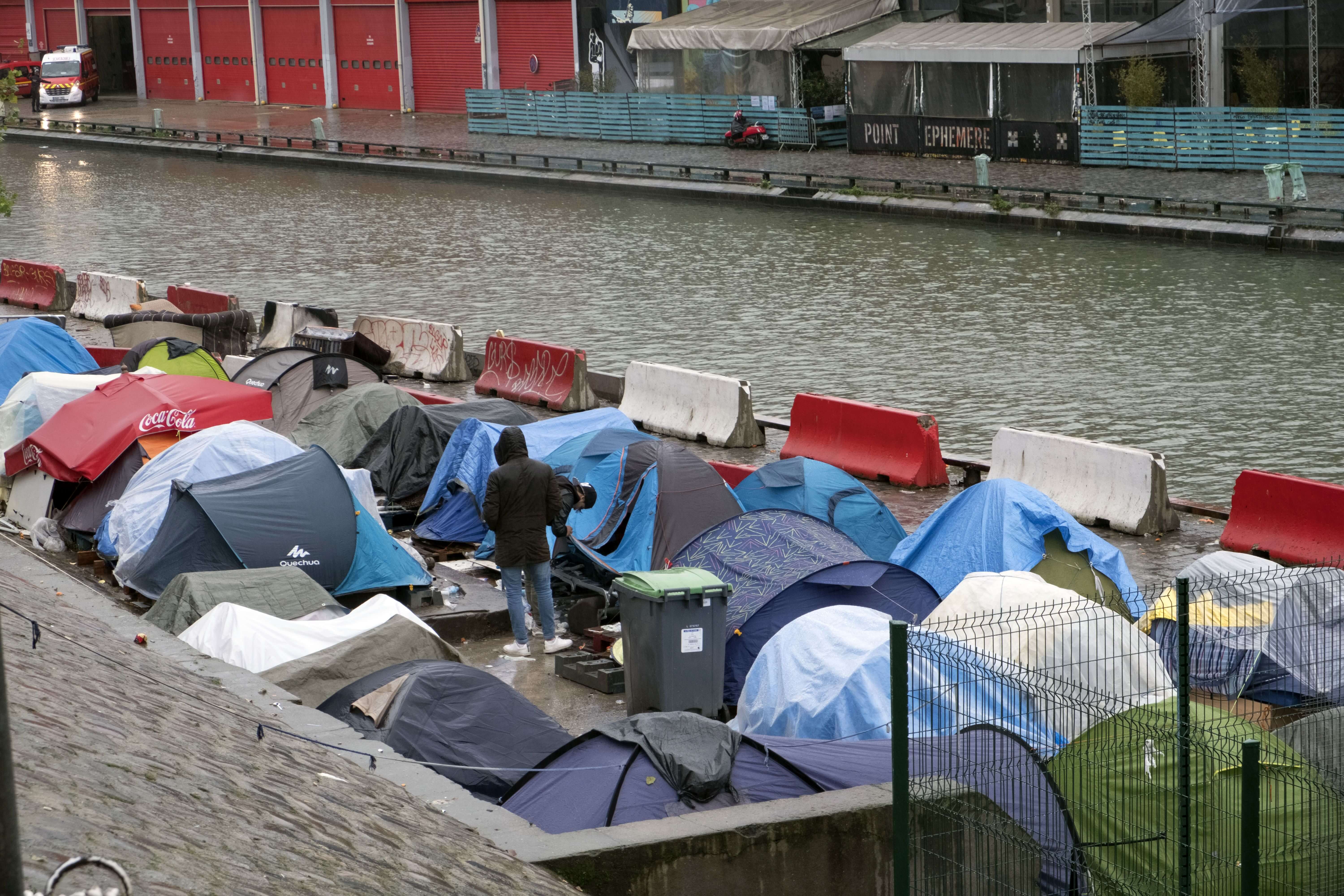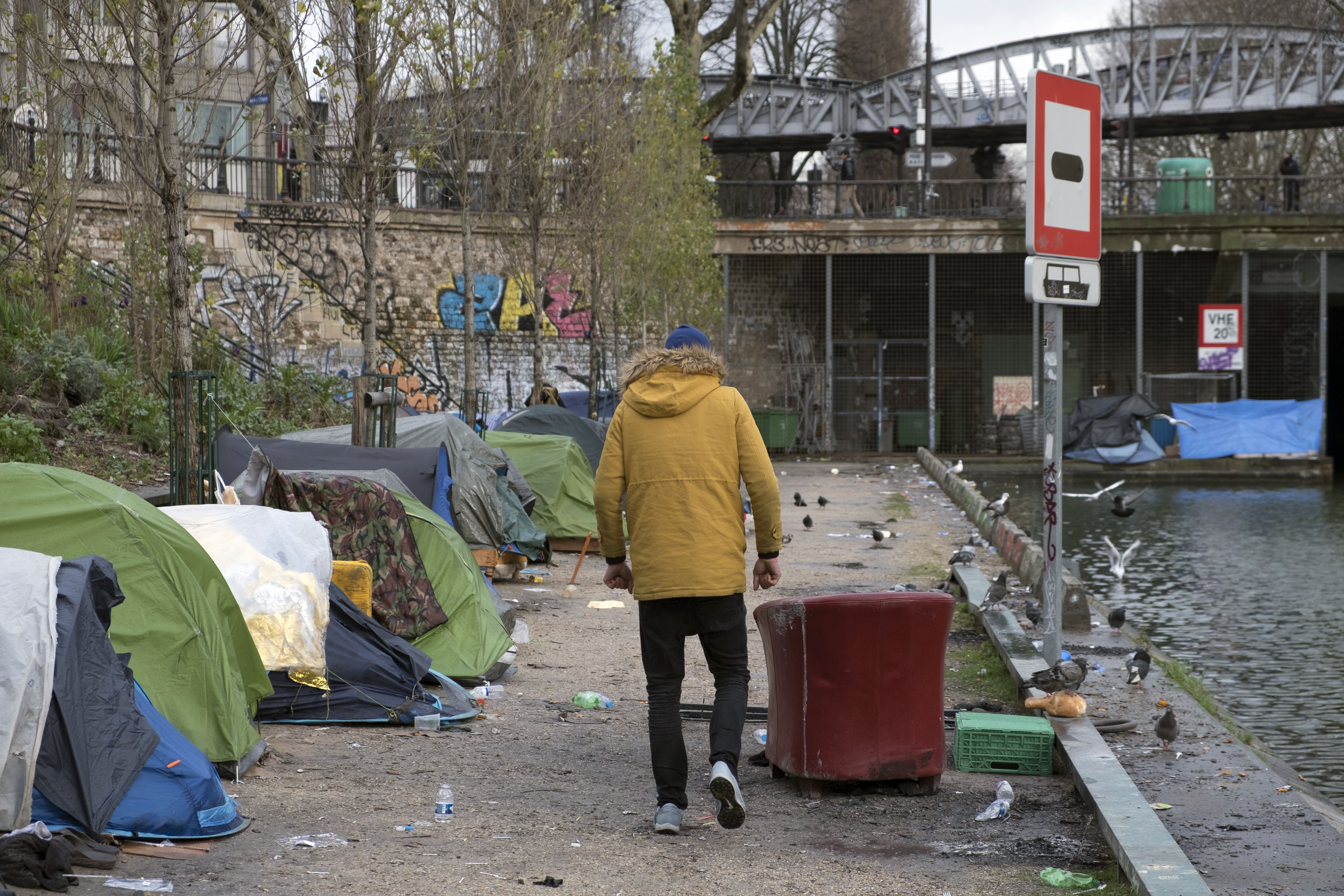Exiting from Jaurès metro station, from the elevated lines, you can see a line of tents below that extends all along the Canal Saint-Martin. We’re at the confines between the X and XIX boroughs, well inside the periphery of Paris, and not far from the centre. Here, camped out in the cold, are more than 400 migrants. Most of the then come from Eritrea, Afghanistan, Sudan but also from countries like Mali or Guinea.
In the last two years, especially after the eviction of the so-called Calais Jungle, tens of informal camps have been set up in the French capital. Expelled by institutional welfare systems, thousands have ended up living in the streets, in tents and shacks, with an almost total absence of essential services and goods. The government’s response has been punctual: as soon as a camp forms it is evicted. According to the Guardian, since 2015 the Paris police have undertaken 37 such operations.
In November 2016 a provisional shelter was set up at Porte de la Chapelle, the only one in Paris set up by the institutions. It can host just 400 people. The first thing you see from the station is a great inflatable container, a dome, and behind it a structure that dominates the horizon. Until last summer, around the official shelter there were people camping under the overpass, among the garbage and continual coming and going of the busy Périphérique boulevard. “Then the police came and evicted everyone, and moved the problem to other parts of the city. They allowed the existence of just one official camp, managed by an important NGO” says Danika, a Croatian volunteer who has followed the journeys of thousands of migrants and found herself in Paris.
In the official structure, a migrant can stay only 10 days. They are then reallocated to a temporary residence somewhere else in the country, assuming they have the right to international protection. As a result, many migrants that pass on from the ‘Boule’ [The ball] as the Port de la Chapelle has become known, end up back on the streets after 10 days. Rather than be sent off god knows where, around the country, many prefer to remain in Paris. Sometimes they organise themselves to try and get to the UK. All this means is that despite the evictions and bans, the city is home to several informal camps, usually found in hard to reach places, out of the visibility of the Parisians. In addition to the 400 or so people at the Canal Saint-Martin, there are more than 500 under the bridge at Canal St. Denis, while another fifty or so minors sleep in Belleville park.

“Listen sorry, I need to go to this office where the lawyer told me, they should give me a place to sleep.” Outside the station at Jaurès I meet a young man with a piece of paper in his hand. He asks me for help. His name is F. He tells me he’s 17 and from Ghana. His voice is syncopated, agitated. It’s only 5 degrees and he is wearing a light t-shirt and a jacket that is totally inappropriate for the Paris snow. “I’ve been here for a month. At the start I found a place to stay. But then I ended up on the streets. It’s cold at night and I have almost nothing to cover myself with” he tells me. He’s wet, freezing, and confused.
“They gave me the number of this lawyer, but I have never met them. He told me to go to a place near here where I could spend the night. But it was closed. So now?” he continues. He doesn’t know what he should do, and has been moving around across the city for hours without finding anything. And yet according to international law, he has the right to special protection, given that he is a minor. He explains that he began the asylum process in Italy but then ended up in France with the hope of arriving in the UK. A new border crossed and a new, heavy, bureaucracy to confront. Too much for a young man who ran away from Ghana two years ago, at 15 years old.
Soon Danika arrives. She knows what it means to be a refugee. In her case it was the war in ex-Yugoslavia that forced her to leave home. She has been a volunteer for many years. “I cook for more than 100 people in the critical points in the city, I give out clothes, and I worked for a bit at the Porte de la Chappele, providing theatre and artistic services for the migrants in the centre,” she says, while she examines F’s documents. She has become a reference point for the hundreds of migrants that populate the streets of Paris.
More and more refugees look for her. They know that in any moment she is ready and willing to help find a roof for someone, or just a mug of warm soup. Danika has seen from the inside how the process of refugee accommodation has changed in France, month by month. “There has now been an emergency for two years” she resumes, giving F. back his papers and signalling him to follow, “they keep on evicting the camps, in the hope that new ones will not be created. Really it’s just a question of time management, the problem, meanwhile, is moved and not solved, as you can see here in the streets.”
We take F. to a space that the Red Cross has set up to offer support for unaccompanied minors. The doctor on duty asks us to leave immediately. “Unfortunately F. was already here a few weeks ago and we cannot offer him support. We don’t have enough space, and his condition is not so terrible that he requires immediate intervention” he says. The result? A Ghanaian refugee, who has passed through the hell of Libya, taken a boat to Italy and then across to France, has no choice but to sleep on the icy pavement. We recuperate a little in a nearby café. F. doesn’t react, probably he doesn’t understand what’s going on. Danika explains to him that the Red Cross cannot help him. “In Africa I have nobody. My mother is dead and I have never known my father. I don’t have any other relatives” he says, without lifting his gaze from the mug of tea that he holds between his hands.
Then he tells us about Libya, where he arrived without money. “I couldn’t get on a boat right away. Then the Arabs kept us locked up, they made me work to pay for the trip. They’d often hit us.” After four months of hard work he had enough money saved up. First he spent a few months in Sicily, then briefly in Milan. “Even there I wasn’t sleeping on the street, I had a place to stay. I decided to try to cross the French border but at the station after Ventimiglia, once I’d already crossed, they sent me back.” Being a minor he has the right to assistance. Instead, it was only by hiding on the bottom of a truck, on his second attempt, that he managed to get into France.
Danika interrupts F.’s story, as if wanting to bring him back to reality. She takes his phone number and assures him that for that night she’ll find him a place to stay. In the meantime we take him to a library at Belleville where at least he can stay warm until 7 o clock. Leaving F., Danika takes me around the various migrant ‘hot spots’, spread across the city.

We arrive at Jaurès and descend to the Canal Saint-Martin.“There are a lot of people here in tents” says my guide as we submerge into a serpent of blue and green tents that cling to the waterfront. There are no sanitised bathrooms, no services. To keep warm, they burn whatever they can find: clothes, plastics, abandoned sleeping bags, cardboard. “Every evening food is distributed” she continues “I don’t do it here, it’s covered by others. But there are other places where nobody goes.” In front of us three people from Afghanistan are putting their tent in order. One of them, A., tells us what life is like here, “The police come very often, sometimes they take away the tents, other times they simply tell us to move on. We don’t know what to do.”
A. is wearing a balaclava and a heavy coat that he uses as a cover inside his lightly insulated tent. All of them came via Serbia. Some were most likely among those in line to receive food in the freezing cold of Belgrade, the photos of which travelled the world before being forgotten, like many others before them. A.’s story is also one of violence and betrayed hopes. “I tried 16 times to get across the Serbian border. I was beaten by Hungarian and Croatian police. Then finally I managed to get here” he says. The journey cost him 2000 EUR and now he wants to reach his brother who lives in England.
What he doesn’t know is that the journey for people like him ends inexorably at Calais. After the jungle, which hosted more than 10,000 was dismantled in October 2016, the authorities no longer tolerate even a single tent. Nobody can stop there to wait for the means or moment to cross the sea. Anyone who does try is forced to hide. According to France24 there are more than 800 migrants hidden among the bushes and forest at Calais, trying, somehow, to get to England. The website Infomigrants, funded by France24, Deutsche Welle and Ansa, describes the situation in the port as “highly explosive.” The migrants there live in situations of extreme precarity. Traffickers continue to get a few people across into the UK, but meanwhile drug violence is increasing, and the clashes between different ethnic groups are a daily reality. In a conflict between Eritreans and Afghanis, a few days ago, more than 20 people were injured, 5 gravely so.
Here in Paris, Eritreans, Afghanis and Sudanese continue to want to reach Calais. Y., a 16 year old Eritrean that we meet at St. Denis, wants to go to England. “My brother is there, here in France I don’t know what to do.” Y. doesn’t want to ask for asylum in France, and renounces the possibility of protection guaranteed to minors. He has a childish face, curly hair and is full of obstinacy. “I don’t know what Calais is like, I don’t even know where it is. I just know you have to go there, to get to the UK. And so I’ll go.”
There are more than 500 here. As in the other camp there are no services, just food distributed in the evening by a few organisations. “This one hasn’t been here long. We’re near Porte de la Chappelle, so many of the people here have already done their ten days in the official space” explains Danika. “At least in the authorised camp, people can take a warm shower, sleep in a heated room, or watch the TV. Here forget it.” On the canal, if all goes well, all that is supplied is a single warm meal, something to chew on as the extraordinary Paris snow returns, rendering these people even more invisible.





